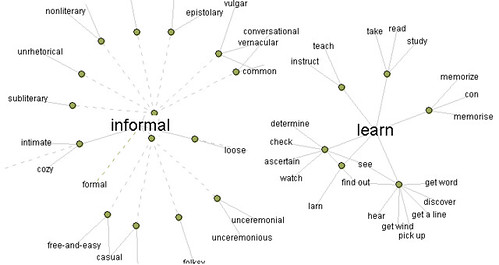Monday, May 02, 2005
from the Wiki
INFORMAL LEARNING
Take out a blank piece of paper or start a new document in your word processor. You're going to do what psychologists call "free association." For the next minute, I want you to reflect on the word learning. Write down whatever comes into your head. Don't make a big deal out of it. Be spontaneous. You may jot down a dozen things. Ready? Put the word learning in your mind's eye. Take a full minute. Go!
Most of the hundreds of people I asked to do this mention classes, courses, workshops, teachers, education and school. Those things are Formal Learning. That's not what we're going to talk about. We're going to look into something more important: the learning that's not prepared in advance. We call it Informal Learning.
School and pre-planned learning events teach but a tiny fraction of what we know about how to do our jobs, appreciate our culture, get along with others, and enjoy our lives.
What we learn out of school is underappreciated. If I learn a new piece of software through trial-and-error, I'm not as aware of learning it as if I'd taken a class, even though I learn more from hacking than from listening. Why? Because formal learning earns credentials. In the world of IT, certificates of skill correlate directly with salary
Learning is everything people do to adapt to their environment that is not genetically determined. DNA is the hard-wired aspect of the body; learning is its malleable software. At the present time, you're stuck with the gene sequences you inherited. All you can change is your learning. Luckily for us, learning is a skill. You can improve your ability to learn.
Learning comes in two varieties: formal and informal. We're going to focus primarily on informal learning, for that's how we humans, especially adults, acquire most of what we know.
Formal learning is school, courses, classrooms, and workshops. It's official. It's scheduled. It teaches a curriculum. Most of the time, it's top-down. Learners are evaluated and graded on mastering material someone else deems important. Those who have good memories or test well receive gold stars and privileged placement. Graduates receive diplomas, degrees, and certificates. Those who do their own thing or test poorly are called failures and are humiliated.
Informal learning flies under the official radar. It can happen intentionally or by accident. No one takes attendance, for there are no classes. No one assigns grades, for success in life and work is the measure of its effectiveness. No one graduates, because learning never ends. Examples are learning through observing, trial-and-error, calling the help line, asking a neighbor, traveling to a new place, reading a magazine, conversing with others, taking part in a group, composing a story, reflecting on the day's events, burning your finger on a hot stove, awakening with an inspiration, raising a child, visiting a museum, pursuing a hobby, traipsing out of one's comfort zone, and on and on and on.
WHAT'S IN IT FOR THE READER?
For you as an individual, we'll give you fifty ways to make your learning better, faster, cheaper, more enjoyable, and more productive. You're invited to cherry-pick the shortcuts, hints, models, and stories that resonate with want you're trying to accomplish. With a topic like informal learning, we're certainly not expecting you to read every page and learn every lesson.
For the manager of an organization, we'll offer ways of looking at informal learning that build a more adaptable workforce, strengthen relationships with customers, reduce operational inefficiencies, and strengthen the connection between strategy and execution. Since people learn their jobs informally, it's foolish to leave it to chance.
FOCUS
This book focuses on adults, not children. We concentrate on learning that improves work although work and life are so intertwined that this is a lot more than job skills training.
Plenty of books have been written on training, instructional design, needs analysis, managing the training function, stand-up instruction, calculating ROI, and conducting meetings. None have addressed informal learning. Learning has been described as lighting a fire. We're more interested in preparing tinder and striking matches than watching old flames.
The literature on education, schools, and school reform is vast. It's not my area of expertise, so I don't intend to supplement the pile.
 w
w
Say the word learning, and most of us think of school, courses, classrooms, and workshops. These are elements of formal learning. Formal learning usually comes with an official seal of approval. It's scheduled. It teaches a curriculum. Learners are evaluated and graded. Those who have good memories or test well receive gold stars and privileged placement. Graduates receive diplomas, degrees, and certificates.
Formal learning takes place when people are not doing. Schools for children are deliberately a world apart. They are greenhouses built to shield and nurture the young by protecting them from the harsh winds of reality. Young adults are sequestered on campuses where town and gown rarely mix. Some continue in academic careers, never to see life outside the ivory tower.
Business managers view learning as an activity that takes people off the job. Often, it removes workers from their place of work. Traditional corporate training sometimes teaches people about the work rather than teaching them the work.
WIIFMLearning. Ho-hum. What's in it for me?
For you personally, happiness, personal growth, self-confidence, wealth.
For organizations, profit, agillity, fiscal health, reputation for good works.
To gather these rewards, I don't expect you to work harder, follow a formula, or attend Tony Roberts revival meetings. You won't attend classes, listen to gurus on tape, nor obsessively number your goals 1, 2, and 3.
Rather, I want to give you a cheatsheet to learning in modern times. I'll encourage you to take advantage of what you already know.
Learning is a process
A workshop on leadership skills, a windsurfing lesson, and a cooking class are each learning events. Often, that procession of events is all we see of learning.
 You can always rise above events to examine process. We can change our focus from telephoto to wide angle. I think of it as going up to the balcony for a look back from a higher level. One of my professors called this flying up in the helicopter. Those who prefer fixed-wing aircraft speak of getting the view from 20,000 feet. It's all the same concept: rising above the level of events to look for patterns in the process.
You can always rise above events to examine process. We can change our focus from telephoto to wide angle. I think of it as going up to the balcony for a look back from a higher level. One of my professors called this flying up in the helicopter. Those who prefer fixed-wing aircraft speak of getting the view from 20,000 feet. It's all the same concept: rising above the level of events to look for patterns in the process.
You've no doubt heard the proverb, "Give a man a fish and he will not be hungry today. Teach a man to fish, and he will be hungry nevermore." Why stop there? "Show a man how to teach fishermen, and his village will always have fish dinners."

Processes are like that. Events come and go. Process improvement is a gift that keeps on giving. Improve a process by 5% this year and you receive 5% the next year and five percent after that ad infinitum. It's like compound interest if you don't make withdrawals. If the Native Americans who sold Manhattan for $24 in glass beads had left the money in a mutual fund, they could buy Manhattan back and still have funds left over.
Learning is a process. You can improve your processing, for instance, cutting the time it takes you to figure something out, improving your social networking skills, or not being like the lumberjack who was too busy chopping trees to find time to sharpen his axe.
I just wasted an hour or my valuable morning time trying to tweak my browser (Firefox) to enable me to cut and paste in the wiki I'm writing this in. I never figured it out. I am not a happy camper. If the authors of the wiki software had thought about it, they would realize that this disability will impact almost every user coming to their software. Not once, but over and over again. WIth my mind focused on my thoughts rather than the tools to communicate them, I tried to cut a couple of superfluous words. Again, I was whisked to an obsolete error message on the Mozilla site. Grrrr.
The software authors have mistaken a process improvement for a single event. They don't see the forest for the trees. They receive a bug report. It goes into the bug-log. When it comes up in its time, they see it as Jay's problem, an incident. It's a recurrent sitatuation. It a process flaw. If they don't fix it, I predict they'll go out of business.
Individual Learning
"Know thyself," commanded Socrates. Nietsche told us to "Be who you are." Joni Mitchell sang "I don't know who I am but life is for learning."
authentic happiness goes here
When my parents were growing up, it was common knowledge that adults could not learn. At least they couldn't learn very much. After all, a fifty-year-old can't compete with a multi-lingual five-year-old. Old brains were thought to fill up with stuff, leaving scant room for more. Others figured they calcified, sort of an arthritis of the noggin. You can't teach an old dog new tricks.